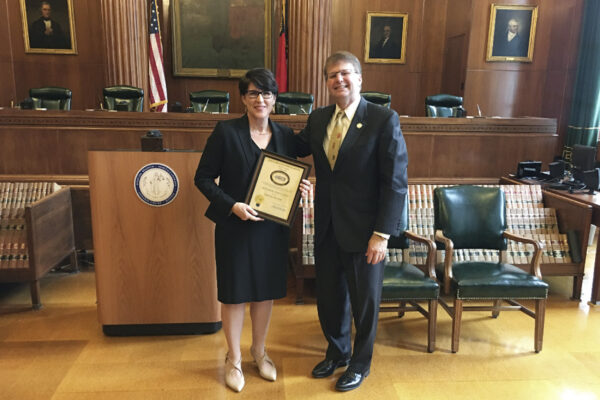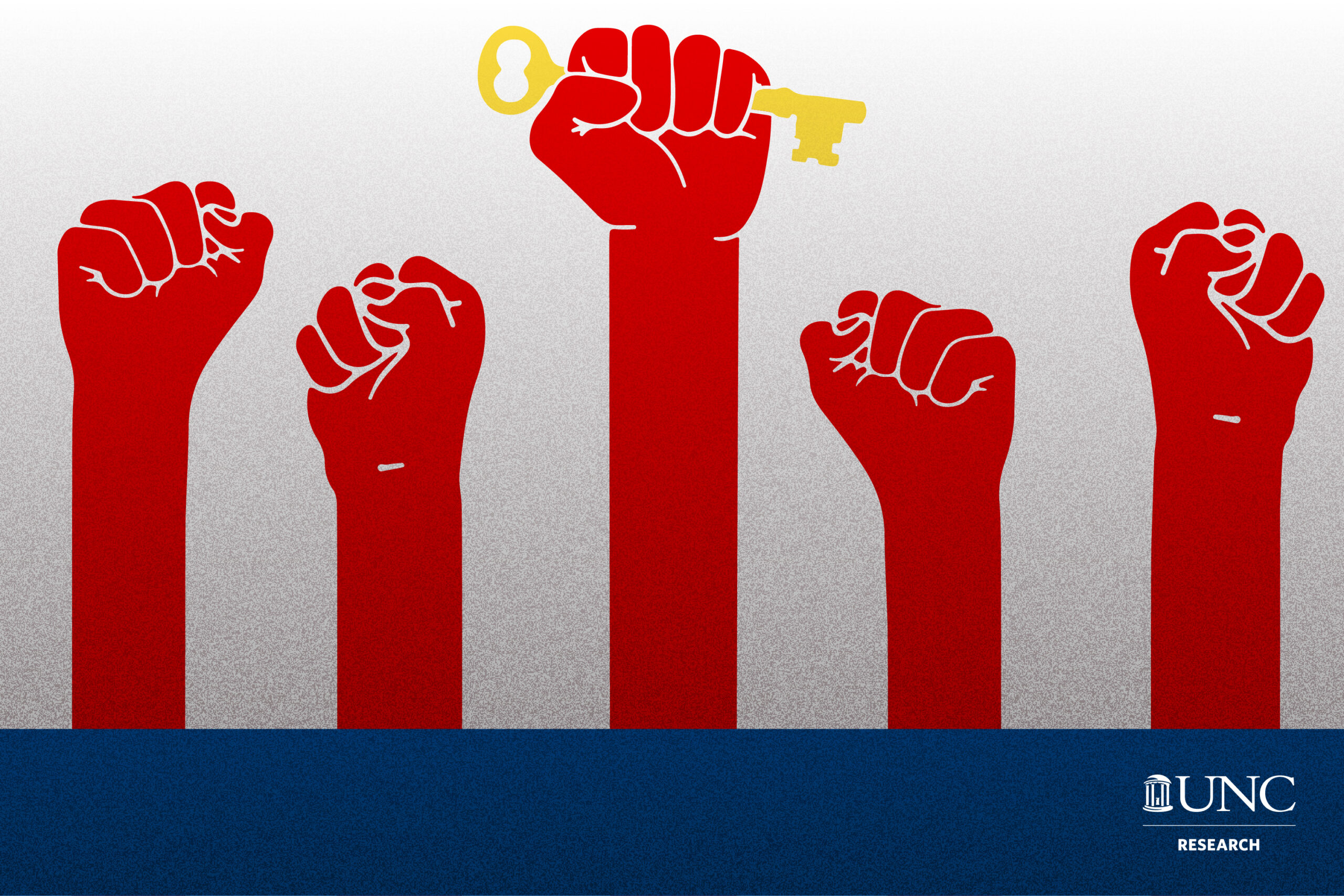The shockwaves caused by the murder of George Floyd by a Minneapolis police officer in May have been felt more than 1,300 miles away in North Carolina. Anti-police brutality protests led by Black Lives Matter activists usher in changes throughout the state. Some police departments, including Raleigh and Charlotte, have started to adopt “8 Can’t Wait” reforms, a list of eight policing policies that, if enacted, could reduce police violence by 72 percent.
The United States criminal justice system is receiving a historic level of critical attention, particularly on front-end issues like police brutality, monetary bail systems, and the criminalization of poverty. While this time is difficult to navigate, Jessica Smith, a professor in the UNC School of Government, remains optimistic about the future — and busier than ever.
Smith, who also runs the Criminal Justice Innovation Lab (CJIL), has worked tirelessly to support evidence-based reforms that promote a fair and effective justice system since she arrived at UNC in 1999. Paperwork covering issues like policing and bail was piled on her desk long before such topics reached 24-hour news cycles in 2020.
“I’m really gratified that people in the community are beginning to understand the intersection of the justice system with so many social issues,” she says.
Smith’s two decades of work have contributed to seismic shifts in the state’s judicial system and led to the 2018 founding of CJIL, which takes on projects with community stakeholders from police associations to public defenders. The lab provides expertise and research on relevant issues and helps project members innovate and then implement solutions. Like any good laboratory, CJIL measures the impact of their efforts. Recent events have increased the volume of interest the lab receives.
“It makes me really hopeful of the talent that will be attracted to the field,” Smith says. “I just got an email from someone who works at a research organization doing non-criminal justice work. He wants to talk about how he can get involved.”
Public officials from the state’s branches of government often call on School of Government faculty to help them with their most pressing problems. As the COVID-19 pandemic caused a massive disruption to the court system, the school’s arsenal of experts rushed to work with court officials on maintaining legal processes during stay-at-home orders. This was soon followed by the death of George Floyd and subsequent protests.
“With recent events bringing attention to policing and criminal justice, that has brought its own wave of issues,” Smith says. “These are things I’ve been working on even before they came to the front page of everybody’s newspaper.”
Smith is optimistic that the current environment will last beyond reactions to headlines and will fuel the evidence-based approaches to justice reform that her two decades at UNC have taught her, firsthand, can lead to change.
The culmination of a career
Smith didn’t grow up dreaming of becoming a law and government professor — but a career dedicated to public service was always in the cards. “I knew that I wanted to have a purposeful life, which in my family we define as leaving the world in a better place than it was,” she says.
In an early demonstration of her work ethic, Smith put herself through undergraduate and law school. Her interest in criminal justice policy was piqued as a student of Leo Levin, a law professor regarded as a father of the study of judicial administration.
“It was from Professor Levin that I had developed a deep appreciation for how the structure of the system impacts everything,” she says.
Inevitable student debt bills led Smith to earn her stripes working in D.C. law offices, before landing federal clerkships. This brought her to North Carolina and ultimately to UNC in 1999, where she began contributing to the UNC School of Government’s mission to improve the lives of North Carolinians.
In addition to their traditional roles as teachers of and advisers to officials throughout the judicial system and law enforcement, faculty also contribute to practical scholarship — publishing handbooks and guides. Smith has published some of the core reference materials that criminal justice officials in the state use today on a daily basis, like the North Carolina Superior Court Judges’ Benchbook, the primary reference tool of N.C. judges on and off the bench. She also produced the treatise North Carolina Crimes, a book purchased by the N.C. court system for every prosecutor, defender, judge, and magistrate — and found in squad cars across the state.
The origins of CJIL, Smith says, were sown when the former Chief Justice Mark Martin asked for her help with the North Carolina Commission on the Administration of Law and Justice (NCCALJ). The commission would scrutinize the state court system and make recommendations for reform, and Smith was appointed reporter for its Criminal Investigation and Adjudication Committee. During that tenure, Smith juggled myriad tasks as reporter: research, brief preparation, and facilitation of stakeholders.

Smith stands with North Carolina Chief Justice Mark Martin, who presented her with the Amicus Curiae Award, which bestows her with the title of “Friend of the Court,” recognizing her for her outstanding service to the Judicial Branch of North Carolina. (photo courtesy UNC School of Government)
She even drafted the committee’s final 20-page report that went to the North Carolina General Assembly — a document that led to monumental changes and in state laws and courts, including the Raise the Age legislation, which mandates that 16- and 17-year-olds would no longer be automatically charged as adults. “It’s historic,” Smith says. “North Carolina set its juvenile age in 1919. It took 100 years. Not for lack of trying, many prior efforts had failed.”
The legislation went on to have overwhelming bipartisan support in the N.C. General Assembly and was enacted into law in 2017. When it went into effect in 2018, North Carolina became the last state in the country to raise the age above 16. Smith thinks the effort succeeded in large part because of its collaborative, evidence-based approach.
“It brought everybody together and aired out all the issues with hundreds of hours spent negotiating and hammering out consensus solutions,” Smith says. “By the time it went over to the legislature, there was tremendous support, because everybody saw that their concerns had been listened to and accommodated, and they could see them in the language of the final bill.”
This formula, thanks to both well-researched policy and stakeholder cooperation, inspired Smith.
“One of the things that came out of that process for me was the ability to work with stakeholders, educate them about issues, and help them innovate solutions. They can change the structure of the system.”
It planted the seed, Smith says, for taking that formula to a place of precedence at UNC. She received overwhelming interest when she brought the school her idea for a center to promote evidence-based criminal justice policy. The CJIL was born. Smith became the full-time director in 2019. Today, she focuses almost entirely on direct, actionable work across the N.C. criminal justice system and collaborates with a range of stakeholders such as judges, prosecutors, defenders, magistrates, clerks of court, law enforcement leaders, probation officers, and county officials.
Lab results
Before Smith became the lab’s director, she essentially had two full-time jobs.
“When I look back on it now, I think it was insane,” she says. “But then I think some more on it and realize that of the things that I’m proudest of in my life, none of them have been easy. I’m happy I did it.”
Already, the lab is at capacity with projects. It is primarily focused on the front-end issues of the justice system, like bail, overcriminalization, indigent defense issues, and policing practices.
“It almost overtook me as soon as I started working on it,” Smith says. “Project after project after project kept coming in, and they were all really important things. And I suppose at any given time, I could have just said, No, I want to leave work at 5 o’clock, but I didn’t find myself able to do that. So here we are, and it’s been a little nutty, but it’s been amazing.”
Smith’s dedication and work ethic are clear to those who work with her. Caitlin Fenhagen, the criminal justice resource director for Orange County, characterizes Smith as “a force of nature.”
Smith is currently facilitating an Orange County pre-trial workgroup focused on bail reform issues by helping them coordinate priorities and lending expertise. Fenhagen is quick to praise Smith for her dedication to the project.
“Jessie is incredible to work with,” she says. “She is laser-focused on our needs and our concerns and moving us where we want to go and providing a lot of insight on ways that we can accomplish what we’re seeking. She’s innovative, and she’s collaborative beyond belief.”
The Orange County project is one of many for Smith. In 2018, CJIL worked on the state’s first-ever court-sponsored bail reform pilot project, the aim of which is to address the criminalization of poverty that money bail systems maintain, in Western Carolina. While cash bail is a common pretrial condition, it is often the poorest citizens who are unable to post bail and leave jail before their trial date. Not only does this contribute to jail overcrowding, but it continues a cycle of poverty, as jailed people’s lives are destabilized financially and socially as they await sentencing. Alternatives to money bail include risk-based or assessment-based systems, which permit pre-trial release from jail based on a defendant’s assessed threat to public safety and likelihood of appearing in court.
After the success of the Western Carolina project, CJIL was tasked to work with another six counties, examining individual bail systems and helping stakeholders design consensus solutions. Now equipped with grant funding, the lab is conducting an empirical evaluation of those efforts.
“We can return information to the stakeholders so they can evaluate their reforms and move forward, improve things that are working, step back from things that aren’t working, and continue this process of improving the function of the criminal justice system.”
Incremental changes, major impacts
The path that criminal justice takes for each individual involved is a matter of choices — including the choices of those in squad cars and courthouses. When someone commits a low-level crime, for example, an officer can choose to issue a citation instructing someone to answer the charge at a court date or make an arrest.
“If the officer chooses to arrest the person, it sets in motion a sequence of events that can change the dynamic of the case and the consequences for the person charged, sometimes in really stunning ways,” Smith explains.
Smith uses the example of a man asking passersby for money outside of a grocery store. Begging, sometimes called soliciting alms, can be a Class 3 ordinance crime. An officer has several options if asked to address the behavior.
“If the officer arrests that man, he will be taken to the magistrate’s office, and if he gets a money bond, he’ll likely end up in jail — because he can’t pay the bond,” Smith says. “Recall that his crime was begging. And after he is convicted, he’ll be back in his community. And nothing has changed. He’s still poor.”
The lab is helping law enforcement leaders examine their options and implement more effective responses.
The “8 Can’t Wait” campaign and other reforms have shone a spotlight on the importance of least harm resolutions in policing. Prior to the events of May, the lab was already working with the North Carolina Association of Chiefs of Police to target these needs. The lab’s Citation Project is grounded in the recommendation of the Task Force on 21st Century Policing that law enforcement agencies pursue least harm resolutions.
One of the main goals of the project is to work with law enforcement leaders to develop a model of citation in lieu of arrest policy for departments to implement. Smith is working on a training manual right now. The plan is to follow the agencies involved for two years to measure the impact of their policy changes on a host of criminal justice metrics, including those on race and other demographics.
Smith hopes that CJIL will go on to accrue more infrastructure funding so they can increase capacity and take on more projects. In the meantime, she may need to grow a few extra arms to handle the workload.
“All you have to do is open up the newspaper to see the number and complexity of issues that need to be addressed — and not in five or 10 years, they need to be addressed now,” she says.
Smith thrives in an environment that many others find impossible, navigating the bureaucracy and red tape of an aged justice system. She admits that there are a lot of roadblocks in her work including poor criminal justice data and differences in how local court systems function. But she tries to follow a principal that she heard from a speaker at her daughter’s college graduation: “Don’t let your inability to fix everything stop you from fixing something.”
She remembers this mantra when she hits inevitable hurdles. “If you can’t figure out how you can solve them, be okay with incremental change, because incremental change can be additive,” she says. “It can all add up to the same thing. And I’m okay with that.”



